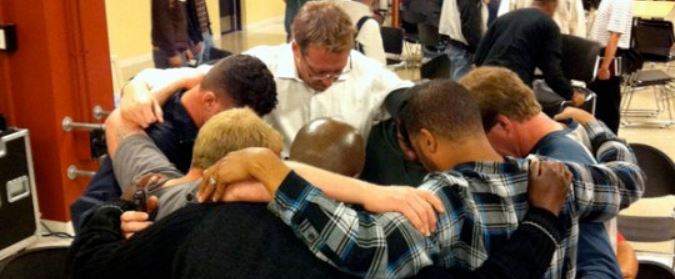Picture this: You’re sitting in your truck after work. The weight of everything—job stress, family pressure, that gnawing anxiety—feels crushing. You know you should “man up” and handle it alone. But what if there was another way? A way that doesn’t compromise your faith or your masculinity? Research shows that men who engage in regular prayer and faith communities experience modestly but significantly improved mental health outcomes. Yet most guys never tap into this powerful resource.
Why Your Faith Matters More Than You Think
Charles Spurgeon: “Prayer is the slender nerve that moves the muscle of omnipotence.”
Let’s cut through the noise. This isn’t about sitting in circles sharing feelings. It’s about accessing a proven tool that’s been helping men overcome life’s toughest battles for thousands of years.
The Baylor Religion Survey, containing the most comprehensive prayer data in the USA, found that praying with others and positive emotions felt during prayer are correlated with greater overall mental health and more positive self-concepts. We’re talking real, measurable changes in your mental wellbeing.
Dr. Rob Whitley from McGill University’s Department of Psychiatry puts it plainly: “The amassed research indicates that prayer is modestly but positively correlated with a range of mental health outcomes.” In his research on recovery from mental illness, participants repeatedly told him that regular prayer was a major factor in their healing.
But here’s where it gets interesting for us guys. Prayer isn’t just about asking for help—it’s about gaining control. When you perceive danger, you’re keyed up and focused on the external world. When you pray, you’re internally focused and attempting to be calm and peaceful. It’s the opposite of the fight-or-flight response that keeps you stressed and anxious. This creates the same nervous system shift that advanced breathing techniques produce—moving from sympathetic to parasympathetic activation.
The Science That Backs This Up
R.C. Sproul: “Prayer is not simply a soliloquy, a mere therapeutic exercise in self-analysis, or a religious recitation. Prayer is discourse with the personal God Himself.”
Here’s the data that’ll change how you think about faith and mental health:
Study 1: Baylor University researchers studied 1,714 people and found that men who pray to a loving and protective God are significantly less likely to experience anxiety-related disorders—worry, fear, self-consciousness, social anxiety, and obsessive-compulsive behavior—compared to those who pray but don’t expect comfort or protection.
Study 2: The comprehensive Baylor Religion Survey (2021) analyzed prayer’s impact on happiness, depression, anxiety, sense of control, mattering, and dignity. The results were clear: “praying with others and positive emotions felt during prayer are correlated with greater overall mental health and more positive self-concepts.”
Study 3: Research published by the PMC found that “prayer efficacy (the belief that prayer can solve personal and world problems)” and devotional prayer (praise of God and prayer for others) showed distinct relationships with reduced anxiety levels.
The bottom line? Faith-based approaches to mental health aren’t just feel-good philosophy. They produce measurable results that can complement traditional treatment.
How Faith Communities Change the Game
John Piper: “Prayer is the open admission that without Christ we can do nothing. And prayer is the turning away from ourselves to God in the confidence that He will provide the help we need.”
Faith communities offer something that individual therapy often can’t: brotherhood. You’re not facing your struggles alone. You’re part of something bigger.
Pastor Brad Hoefs, founder of Fresh Hope for Mental Health, saw this need firsthand. In 2007, he felt called to start a faith-based support group for men struggling with mental health issues. What started as one group has now expanded to approximately two dozen support groups at churches across fourteen states, Canada, England, and Australia.
The Mental Health Grace Alliance reports that their Grace Groups have been proven to provide practical support, hope, and growth for any mental health journey. Their approach combines Scripture and practical tools to help men achieve mental well-being—not by ignoring science, but by integrating it with faith.
NAMI FaithNet, the interfaith resource network, encourages faith communities to be welcoming and supportive of men living with mental illness. They’ve found that for many men, faith is a key component of their recovery journey.
What This Looks Like in Real Life
Charles Spurgeon: “The best prayers have often more groans than words.”
Christian mental health support isn’t about replacing professional treatment. It’s about adding another powerful tool to your toolkit. Here’s how effective faith communities approach men’s mental health:
Hope’s Nest in Lexington, KY meets monthly at a United Methodist Church. They create a safe space where men can share struggles, receive encouragement, and gain God’s perspective on their challenges. Attendees report finding fellowship, problem-solving opportunities, and discovering they’re not alone in their struggles.
Fresh Hope groups use six faith-based Biblical principles specifically designed for those with mental health issues. The curriculum addresses practical issues while helping men reconnect with God through authentic relationships with other believers.
Warrior Men’s groups like the one at WestGate Church focus on men seeking purity and healing in all areas of life—faith, family, finances, and fellowship. They create brotherhood among men striving to live out God’s best for their lives.
Take Action: Your Path Forward
Dietrich Bonhoeffer: “The person who loves their dream of community will destroy community, but the person who loves those around them will create community.”
1. Start With Prayer—But Do It Right
Research shows that how you view God affects prayer’s impact on your mental health. Focus on God as loving and protective, not distant or punishing. Spend 10 minutes daily in devotional prayer—praising God and praying for others’ well-being.
2. Find Your Tribe
Look for established Christian mental health groups in your area. Organizations like Fresh Hope, Mental Health Grace Alliance, and NAMI FaithNet offer directories of local groups. Don’t go it alone when you don’t have to.
3. Join a Men’s Group
Many churches have men’s groups that address life challenges from a faith perspective. Even if they don’t specifically focus on mental health, the brotherhood and accountability can be powerful tools for healing.
4. Connect Faith and Professional Help
Don’t see faith and therapy as either/or choices. Two-thirds of Americans prefer to see a psychotherapist with spiritual values. Look for Christian counselors who can integrate your faith into your healing journey.
5. Start Conversations in Your Church
If your church doesn’t have mental health resources, be the guy who starts the conversation. Contact organizations like Mental Health Grace Alliance for free training on starting groups.
Try This Today

Right now, identify one person in your life who shares your faith and might understand your struggles. Send them a text: “Hey, can we grab coffee this week? I’d like to talk about some stuff I’m working through.” Taking that first step toward community is often the hardest—and most important—move you’ll make.
The research is clear: Men who engage with faith communities for mental health support don’t just survive their struggles—they thrive. Prayer provides a sense of control and peace. Community offers brotherhood and accountability. Together, they create a foundation for real, lasting change.
Your faith isn’t a weakness you need to hide. It’s a strength you can build on. Tomorrow, we’re exploring “Sleep and Relationships: How Your Rest Affects Others”—because healing happens best when all areas of life work together.
🤝 You’re not alone in this journey
Resources
- Prayer and Mental Health – Psychology Today
- Unpacking the Relationship Between Prayer and Anxiety – PMC
- Prayer and Mental Well-Being in the United States – Journal of Religion and Health
- Faith Support Groups – National Alliance on Mental Illness
- Mental Health Grace Alliance
- Fresh Hope for Mental Health
- Christian Mental Health Groups – Church and Mental Health
- The benefits of prayer: What science says – CNN

Leave a Reply